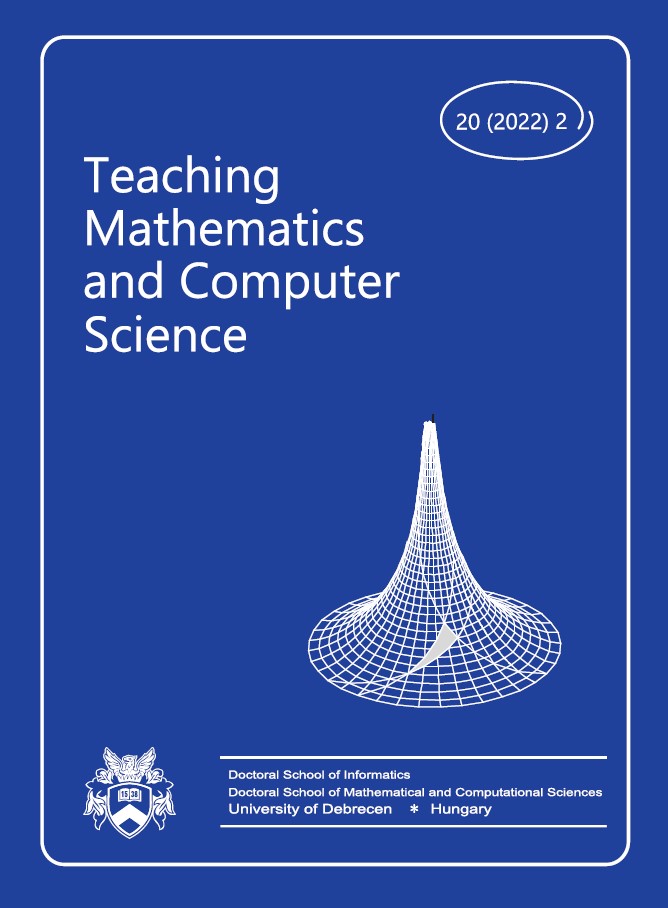Vol. 20 No. 2 (2022)
##issue.tableOfContents##
Articles
-
Thoughts on Pólya’s legacy
157-160Views:236There is a saying, "the older I get, the smarter my parents become." What it means, of course, is that the more we learn, the more we appreciate the wisdom of our forebears. For me, that is certainly the case with regard to George Pólya.
There is no need to elaborate on Pólya's contributions to mathematics – he was one of the greats. See, for example, Gerald Alexanderson's (2000) edited volume The Random Walks of George Pólya, or Pólya's extended obituary (really, a
53-page homage) in the November 1987 Bulletin of the London Mathematical Society (Chung et al., 1987). Pólya was one of the most important classical analysts of the 20th century, with his influence extending into number theory, geometry, probability and combinatorics.PDF330 -
Pólya’s influence on (my) research
161-171Views:257In this article, I outline the influence of George Pólya's work on research in different areas and especially on mathematics education, namely heuristics and models of the problem-solving process. On a more personal note, I will go into some details regarding Pólya's influence on my own work in mathematical problem solving with a focus on the research project for my PhD thesis.
Subject Classification: 97xxx
PDF392 -
Consequences of a virtual encounter with George Pólya
173-182Views:207The consequences of a virtual encounter with George Pólya as a teacher are recorded. An instance of his influence on my mathematical thinking is recounted through work on one of the problems in one of his books.
Subject Classification: 01A99, 11A05, 97-03, 97D50
PDF225 -
Teaching undergraduate mathematics - a problem solving course for first year
183-206Views:222In this paper we describe a problem solving course for first year undergraduate mathematics students who would be future school teachers.
Subject Classification: 97B50, 97B70, 97D50, 97D60, 97F60, 97U30
PDF329 -
Looking back on Pólya’s teaching of problem solving
207-217Views:497This article is a personal reflection on Pólya's work on problem solving, supported by a re-reading of some of his books and viewing his film Let Us Teach Guessing. Pólya's work has had lasting impact on the goals of school mathematics, especially in establishing solving problems (including non-routine problems) as a major goal and in establishing the elements of how to teach for problem solving. His work demonstrated the importance of choosing rich problems for students to explore, equipping them with some heuristic strategies and metacognitive awareness of the problem solving process, and promoting 'looking back' as a way of learning from the problem solving experience. The ideas are all still influential. What has changed most is the nature of classrooms, with the subsequent appreciation of a supporting yet challenging classroom where students work collaboratively and play an active role in classroom discussion.
Subject Classification: 97D50, 97A30
PDF648 -
Realizing the problem-solving phases of Pólya in classroom practice
219-232Views:328When teaching mathematical problem-solving is mentioned, the name of Pólya György inevitably comes to mind. Many problem-solving lessons are planned using Pólya's steps and helping questions, and teachers often rely on his heuristics even if their application happens unconsciously. In this article, we would like to examine how the two phases, Making a plan and Looking back, can be realized in a secondary school mathematics lesson. A case study was designed to observe and analyse a lesson delivered using cooperative work.
Subject Classification: 97B10, 97C70, 97D40, 97D50
PDF384 -
The tradition of problem-posing in Hungarian mathematics teaching
233-254Views:336Based on the literature, Pólya was influential in problem-posing research. The present paper draws attention to a book written with Pólya's collaboration, which has not yet received sufficient emphasis in the problem-posing literature. On the other hand, Pólya's impact on mathematics education in Hungary has been significant, including the problem-posing paradigm. Two works, published only in Hungarian, that rely heavily on problem-posing are highlighted. Furthermore, it is presented how problem-posing appeared in the Hungarian Complex Mathematics Teaching Experiment (1962-78) led by Tamás Varga.
Subject Classification: 97D50
PDF400







